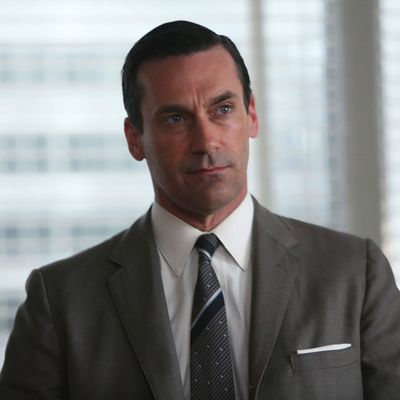
In musicals, when characters break out into song, they’re suddenly allowed — and expected, maybe — to be completely on-the-nose. “I want [this].” “People think I love her, but I actually love her.” “I am now in love.” That’s how Mad Men often uses its drug sequences, to tell us in no uncertain terms what the episode or at least the moment is about. On Sunday night’s “A Tale of Two Cities,” (read our recap here) a stoned Don hallucinated a pregnant Megan joining him at the party. “What do you think it is?” Don mumbled, presumably regarding the Draper fetus. “A second chance,” Megan purred. Did everyone get that? Shout it right out, Megan: A second chance. A second chance at so many things!
There are loads of second chances in “Two Cities.” Danny Siegel, the former (terrible) copywriter at SCDP, has gotten a second chance as a super-groovy screenwriter. Joan, who despite her partnership is still totally trapped in a subordinate role at the office, gets a second chance at defining her career, this time as an accounts person. Everyone at Sterling Cooper has been through a merger before — and had to stage a bizarre sort of coup to get out of it — and this is their second chance at getting it right. (Forecast: cloudy.) Don requests a second trip to Disneyland. Peggy gets a second chance at a makeup pitch, reliving her big break from Belle Jolie’s “mark your man” campaign. Richard Nixon had run for president once before and lost, but here was his second chance in 1968. Even the closing song is all about a woman whose lover has had chance after chance to take a little piece of her heart now, baby.
In a way, “A Tale of Two Cities” is itself a second chance. Again and again this season, and more so than in any other, new episodes seem to echo episodes from older seasons. This week’s episode was a redo of “The Jet Set,” season two’s eleventh episode, and the show’s first hazy tale of California dreaming. In that episode, Don and Pete head out west for a series of meetings that Don winds up not even attending, so totally captivated is he by Joy, a young blonde “nomad.” Don follows her to Palm Springs, where he passes out by the pool and briefly considers joining her on some kind of responsibility-free globe trot. Instead, he calls Anna Draper.
No such phone call this time. The direct echos of “The Jet Set” in “A Tale of Two Cities” are almost all terrible; things have gotten worse. In “The Jet Set,” everyone is watching the news, following the story of James Meredith, the first black student at the University of Mississippi, whose enrollment caused a riot and prompted President Kennedy to send in the National Guard. In “Two Cities,” Megan and Don watch footage of the police beating protesters outside the Democratic Convention. Things have not gotten better, they’ve gotten more violent and frightening. In “The Jet Set,” Duck Phillips is orchestrating Sterling Cooper’s merger with Putnam, Powell, and Lowell; that ended so badly that Don and Roger had to stage a coup to get out. You’d think they’d know better by “Two Cities,” but instead, it’s merger time again, only this time instead of Mr. Sheffield from The Nanny, they’re contending with Harry Hamlin. In “The Jet Set,” German designer Kurt un-self-consciously announced that he’s “a homosexual” (Ken: “I don’t think that means what you think it means”). In “Two Cities,” Ginsberg asks Bob Bensen if he’s “a homo,” and not kindly, in an “I’m open-minded” way. When Don passed out in “The Jet Set,” he merely collapsed near a pool. This time, he fell right in.
Don’s had second, third, fourth, twentieth chances with women, with himself, with confronting his death wish, and it’s the same over and over: Denial, denial, denial, denial, denial. Don’s in so much denial he can barely acknowledge that he’s actually literally drowning. “Dying doesn’t make you whole,” Don’s imagined GI pal from the season premiere tells him. Did you catch it? Was it clear enough? There’s nothing powerful enough to make Don whole, not even death. And yet here he is, trying again, taking one more second chance.

